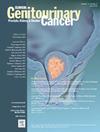Radical Prostatectomy Versus Radiation Therapy for Locally Advanced and Clinically Nodal Positive Prostate Cancer
IF 2.7
3区 医学
Q3 ONCOLOGY
引用次数: 0
Abstract
Introduction
Radical prostatectomy (RP) and radiation therapy (RT) are both recommended as standard-of-care for advanced prostate cancer (aPCa). However, data on comparisons for aPCa are scant.
Patients and Methods
We relied on the University Cancer Center database to investigate outcomes in metastasis-free (MFS), cancer-specific (CSS) and overall survival (OS) of cT3-4 and cN1 RP versus RT-treated patients between 2014 and 2024.
Results
Of 1017 cT3-4 patients, 93% underwent RP, which were significantly younger (67 vs. 75 years) and harbored significantly lower PSA level (9.3 vs. 12.7 ng/ml). Moreover, significant higher rates of ISUP4-5 in RT patients were observed (51% vs. 37%, P = .001). Univariable MFS, CSS and OS outcomes did not differ for cT3-4 patients. In multivariable adjusted MFS, CSS and OS outcomes also no difference between RP vs. RT-treated cT3-4 patients were observed (all P > .05). Of 239 cN1 patients, 87% underwent RP, which were also younger (66 vs. 73 years, P < .001) and with clinically meaningful lower PSA level (15.4 vs. 29.0 ng/ml, P = .09), relative to RT patients. In univariable MFS analyses, RT provided better results, with no differences for CSS and OS. However, after multivariable adjustment MFS, CSS and OS analyses showed no significant differences between RP vs. RT-treated cN1 patients (all P > .05).
Conclusion
Real-world evidence of currently RP vs. RT-treated locally advanced cT3-4 and clinically node-positive prostate cancer patients suggest equally efficient cancer-control outcomes such as MFS, CSS and OS when adjusting for different patient and tumor characteristics and show excellent cancer control rates in this very-high risk cohort.
根治性前列腺切除术对局部晚期和临床淋巴结阳性前列腺癌的放疗
根治性前列腺切除术(RP)和放射治疗(RT)都被推荐为晚期前列腺癌(aPCa)的标准治疗方法。然而,亚太地区的比较数据很少。患者和方法:我们依靠大学癌症中心的数据库,调查2014年至2024年间cT3-4和cN1 RP与rt治疗患者的无转移(MFS)、癌症特异性(CSS)和总生存(OS)的结果。结果在1017例cT3-4患者中,93%接受了RP,这些患者明显更年轻(67岁vs. 75岁),PSA水平显著降低(9.3 vs. 12.7 ng/ml)。此外,在RT患者中观察到ISUP4-5的发生率显着升高(51%对37%,P = .001)。cT3-4患者的单变量MFS、CSS和OS结果没有差异。在多变量调整的MFS中,CSS和OS结果在RP与rt治疗的cT3-4患者之间也没有观察到差异(所有P >;. 05)。239例cN1患者中,87%接受了RP,患者年龄也较轻(66岁vs. 73岁,P <;.001), PSA水平相对于放疗患者有临床意义的降低(15.4 vs. 29.0 ng/ml, P = .09)。在单变量MFS分析中,RT提供了更好的结果,CSS和OS没有差异。然而,在多变量调整后,MFS、CSS和OS分析显示RP与rt治疗的cN1患者之间没有显著差异(所有P >;. 05)。结论:RP与rt治疗的局部晚期cT3-4和临床淋巴结阳性前列腺癌患者的真实证据表明,在调整不同患者和肿瘤特征时,同样有效的癌症控制结果,如MFS, CSS和OS,并且在这个非常高风险的队列中显示出出色的癌症控制率。
本文章由计算机程序翻译,如有差异,请以英文原文为准。
求助全文
约1分钟内获得全文
求助全文
来源期刊

Clinical genitourinary cancer
医学-泌尿学与肾脏学
CiteScore
5.20
自引率
6.20%
发文量
201
审稿时长
54 days
期刊介绍:
Clinical Genitourinary Cancer is a peer-reviewed journal that publishes original articles describing various aspects of clinical and translational research in genitourinary cancers. Clinical Genitourinary Cancer is devoted to articles on detection, diagnosis, prevention, and treatment of genitourinary cancers. The main emphasis is on recent scientific developments in all areas related to genitourinary malignancies. Specific areas of interest include clinical research and mechanistic approaches; drug sensitivity and resistance; gene and antisense therapy; pathology, markers, and prognostic indicators; chemoprevention strategies; multimodality therapy; and integration of various approaches.
 求助内容:
求助内容: 应助结果提醒方式:
应助结果提醒方式:


